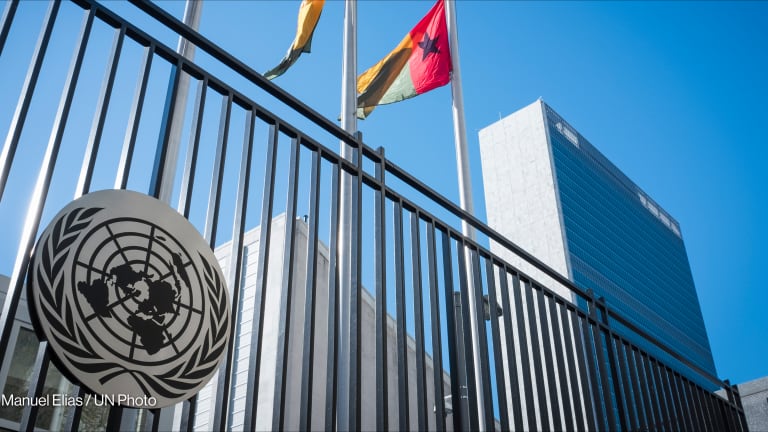
NEW YORK — United Nations leaders have launched a $2 billion global humanitarian funding appeal for COVID-19, aiming to get ahead of the global health pandemic before it hits vulnerable populations and weak health systems across South America, Africa, the Middle East, and Asia.
“COVID-19 is menacing the whole of humanity — and so the whole of humanity must fight back.”
— António Guterres, secretary-general, U.N.“This is not a financial crisis. This is a human crisis,” U.N. Secretary-General António Guterres said during a media briefing webcast on Wednesday.
COVID-19 — a timeline of the coronavirus outbreak
Follow the latest developments on the new coronavirus that causes COVID-19.
“COVID-19 is menacing the whole of humanity — and so the whole of humanity must fight back. Individual country responses are not going to be enough,” Guterres continued.
The COVID-19 pandemic has so far killed over 21,000 people, with nearly 500,000 confirmed cases of infection worldwide.
All U.N. agencies, including UNICEF and the World Health Organization, will work jointly to implement the new response plan, overseen by the United Nations Office for the Coordination of Humanitarian Affairs. The implementation will reflect the “tried and tested” approach the U.N. last used during the 2014-16 Ebola outbreak, OCHA head Mark Lowcock said during the briefing.
Lowcock also announced Wednesday that he has released an additional $60 million from the U.N.’s Central Emergency Response Fund to kickstart funding for the U.N. plan, bringing the total amount of CERF support for the COVID-19 pandemic to $75 million. About a quarter of this funding will go toward air travel for aid workers and supplies.
“We need a big scale-up to compensate for the reduced availability of air services,” Lowcock said. “It is absolutely crucial in order to keep front-line aid workers doing their job in combating the pandemic.”
The broader U.N. plan, if funded by member states, will also establish air bridges and hubs to move humanitarian workers and supplies. U.N. agencies would install hand-washing stations in refugee camps and settlements, deliver medical supplies for treatment, and launch public information campaigns on the new coronavirus.
The $2 million plan consolidates appeals already issued by individual U.N. agencies. UNICEF, for instance, has appealed for more than $651 million for its pandemic work, UNICEF Executive Director Henrietta Fore said during the briefing.
While only a small amount of cases have been reported so far in countries with fragile health systems in Africa and other regions, the U.N. expects the number of confirmed infections in these places to quickly rise, according to Lowcock.
“Properly funded, [the plan] will help contain the spread of COVID-19, and it will help save lives. We know the virus is now arriving in countries least equipped to deal with it. Once there, it will hit some of the most vulnerable,” Lowcock said.
The recommended practice of social distancing or self-isolation “cannot be easy — and in some cases, impossible” if a family of six or eight people lives in a single-room home, Fore said. And other standard medical advice on COVID-19 prevention — routine, thorough hand-washing, among other measures — may not be practical in many cases.
Approximately 2.2 billion people globally do not have safe drinking water, and 4.2 billion — about 40% of the global population — lack safe sanitation services, according to U.N. figures.
“To leave the world’s poorest and most vulnerable countries to their fate would be both cruel and unwise. If we leave coronavirus to spread freely in these places, we would be placing millions at high risk, whole regions will be tipped into chaos, and the virus will have the opportunity to circle back around the globe,” Lowcock said.
As the U.N. consolidates and expands its coronavirus response, the system needs to also maintain its ongoing work. Withdrawing funding from other areas of development and humanitarian work to support COVID-19 prevention and treatment would be “counterproductive,” Lowcock said.
Guterres has warned member states that diversion of funding from existing humanitarian operations could lead to a rise in cholera, measles, meningitis, and malnutrition — creating a “perfect breeding ground for the coronavirus,” the U.N. said in a media release.
The U.N. is also continuing to press for an end to all political conflicts, which Guterres called for earlier this week. A rebel group in the Philippines recently responded to Guterres’ plea and agreed to a cease-fire. And all U.N. special envoys and special representatives are now taking “diplomatic initiatives” to continue negotiating cease-fires, Guterres said.
“We must come to the aid of the ultravulnerable — millions upon millions of people who are least able to protect themselves. This is a matter of basic human solidarity. It is also crucial for combating the virus. This is the moment to step up for the vulnerable,” Guterres said.








